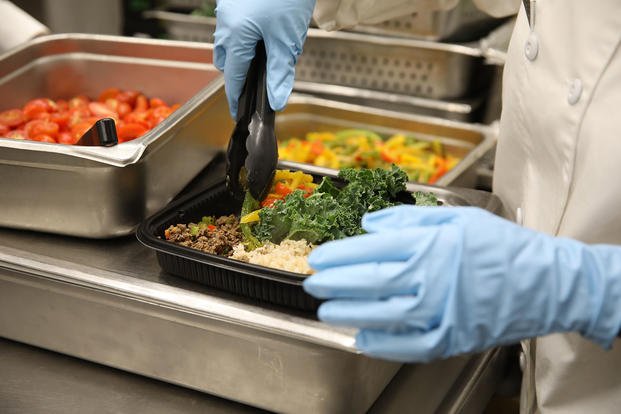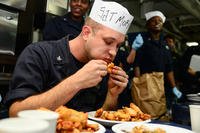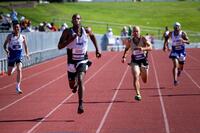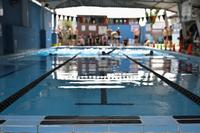No matter what your training goal is, you can't do it without putting the right fuel into your body. An optimal diet requires a disciplined eating plan, complete with all the nutrients your body needs to perform and recover.
Many mediocre physical performances can be attributed directly to a lack of fuel in the body on game day or PT test day. There are many sayings in the training world that best explain the importance of healthy eating and exercise goal achievement:
- "You cannot outwork your diet."
- "You cannot outrun your fork."
- "You cannot compete with what you eat."
- "Anyone can work out for an hour, but controlling what you eat the other 23 hours of the day requires the real work."
- "Abs are made in the kitchen."
In the end, this ability to eat properly, train hard and rest sufficiently comes down to discipline. There are many ways in which we fail to maintain good eating habits, and it depends upon our goals: PT test performance, weight loss, weight gain, body toning, athletic performance, recovery and many more. Here is a list of common ways we fail and helpful tips to stay on track, even if we are training hard for an hour or more a day:
1. Traveling is a big killer for maintaining your regular schedule for anything, including eating. You have to look really hard to find nutritious options when away from your kitchen. This may require planning ahead with healthy snacks during the drive or flight, and if you can find a salad bar during your journey and destination, you will feel better than if you settled for fried fast foods.
Also hydrate. Traveling, especially on planes, can dehydrate you from pressurized cabins and arid air. When in doubt, drink water.
2. Working early, staying late and adding a lengthy commute to the day can disrupt training for the most disciplined people. Just training for 30-60 minutes is difficult, and squeezing in proper nutrition time compounds the problem. It is easy to settle for less healthy foods in this scenario.
This is when planning comes in. Making your own lunch, along with midmorning and afternoon snacks, will help you feel better at work and likely even more productive, so you can leave at quitting time or take a training break if time permits. Once again, disciplined habits have to win the day to achieve these health goals.
3. Eating out is often the biggest killer to a weight-loss plan, but it can be great for a weight-gain program. The added calories and portion size of most restaurants is typically more than you need to maintain or lose weight, but might be right in the ballpark if you are training hard to get bigger.
Another saying is, "If you want to be big, you have to eat big," and the added calories per day of the average traveler is ideal for this type of goal. Not so much for the athlete seeking to lose or maintain weight. If you cannot make your own meals or you are just going out to eat with family and friends, try to manage a bigger salad for starters with a lean protein source. If that serving size is too big, take half of it home for a meal in the next 24 hours.
4. Depending upon your goal in fitness and health, the eating plan you set a course on will differ tremendously. If you are training hard with an athletic- or selection-type program performance goal in your future, you may find that with multiple hours of training, it is difficult to maintain weight, so adding even more calories to your diet will help you do that. Eating even more during this hard training program will be required if you are trying to gain weight (on top of hard cardio events -- running, swimming, rucking).
If you are trying to lose weight and do this hardcore training, not eating enough food can cause daily performance/recovery deficits so you have to find the balance between weight-loss nutrition and performance through trial and error. A weight-loss or weight-gain program will require an element of exercise to have this goal stay as a healthy choice. The balance between calorie deficits and surpluses and the end of the day is key. However, eating healthy food options is the only way to have energy to do exercise and the rest of your busy day. See links below for healthy food options.
5. Doing research for this article, I found some information in the below links of recommended reading. I also found a fun survey of questions, asking the reader whether they were guilty of these common mistakes people make with their diet. See the Diet Survey link as well as the links below for more outstanding information about creating habits that are hard to break.
Recommended reading link:
ABDs of Nutrition: Consider what you eat and drink before, during and after workouts to get to and through and recover from tough physical events.
Stew Smith is a former Navy SEAL and fitness author certified as a Strength and Conditioning Specialist (CSCS) with the National Strength and Conditioning Association. Visit his Fitness eBook store if you're looking to start a workout program to create a healthy lifestyle. Send your fitness questions to stew@stewsmith.com.
Want to Learn More About Military Life?
Whether you're thinking of joining the military, looking for fitness and basic training tips, or keeping up with military life and benefits, Military.com has you covered. Subscribe to Military.com to have military news, updates and resources delivered directly to your inbox.



















